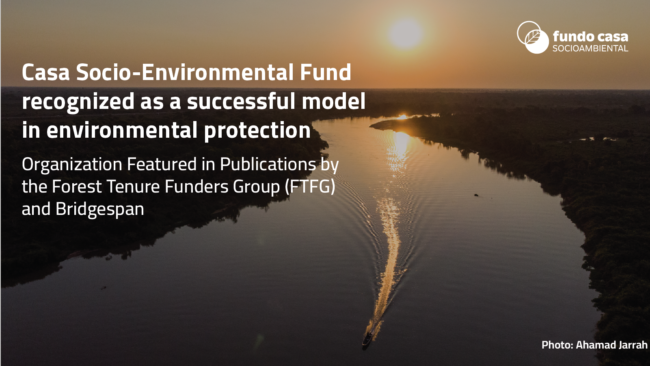 29.08.2024
29.08.2024
Casa Socio-Environmental Fund recognized as a successful model in environmental protection
Organization Featured in Publications by the Forest Tenure Funders Group (FTFG) and Bridgespan
The Casa Socio-Environmental Fund has stood out as a remarkable example of success in the global landscape of environmental protection and territorial rights funding. The organization’s approach has gained international recognition for effectively channeling significant resources directly to local communities—an area that remains a challenge for many of the foundations and organizations that dominate global philanthropy.
Two recent publications highlight the significant impact of the Casa Fund in promoting socio-environmental justice in Brazil. The first is a Case Study commissioned by the Ford Foundation for the Forest Tenure Funders Group (FTFG), a group formed during COP 26 in Glasgow with the commitment to channel resources directly to Indigenous Peoples and Local Communities, titled “Forging Resilient Pathways.” The second is The Bridgespan Group’s report, “Want to Fund in the Global South? Philanthropic Collaboratives Can Help.” Both emphasize the Casa Fund’s crucial role in preserving standing forests and defending the rights of local communities.
The organization was one of 10 chosen for the case study developed by the FTFG, demonstrating its ability to directly finance the populations that protect the world’s major forests. The publication highlighted the importance of funding pathways for forest protection and territorial management by indigenous and local communities. Among the cases studied, the Casa Fund was noted as an example of effectiveness and impact in channeling resources.
The Casa Fund’s methodology, based on the active identification of strategic and impactful projects, was praised for reducing the administrative burdens on beneficiaries, allowing local groups to focus more on their essential activities and less on bureaucratic processes. Furthermore, it was the only organization from South America recognized for its ability to establish trusting relationships with indigenous and local communities, facilitating long-term planning and the implementation of sustainable projects.
In a similar vein, The Bridgespan Group’s recent report, published in June 2024, highlights one of the Casa Socio-Environmental Fund’s greatest successes: its collaboration with 57 indigenous organizations to protect approximately 63 million hectares of forests—an area nearly the size of France. The support was provided between 2020 and 2022 with assistance from the Gordon and Betty Moore Foundation. This specific program donated 1 million dollars directly to organizations in 46 Indigenous Lands in the Brazilian Amazon. It’s worth noting that this investment constitutes less than 8% of all the support that the Casa Fund has provided to indigenous peoples throughout its history.
The impact of this support is fundamentally important, as it demonstrates how direct collaboration and local knowledge can yield effective results in environmental conservation and social justice. This sample, representing only 8% of the Casa Fund’s support, has managed to protect 63 million hectares of forest, is but a sample of the broader protection achieved through the 727 indigenous projects supported over Casa’s history, benefiting 182 of the 305 recognized ethnic groups in Brazil—a historic milestone.
A notable achievement highlighted in the document was the support for the purchase of technology equipment to monitor and report threats to indigenous lands, resulting in the identification and arrest of illegal loggers and miners. During the Amazon fires in 2019, the organization helped protect forested areas and supported local brigades in the Pantanal biome. These actions had such significant positive impact that the program was extended in the following years.
The Bridgespan report emphasizes the importance of these collaborative funds in connecting donors with organizations closest to the issues, providing a more significant and sustainable impact.
“Casa Fund helps amplify voices that are often silenced or lack visibility,” says Puyr Tembé, president of the Federation of Indigenous Peoples of the State of Pará.
The report by The Bridgespan Group further suggests that collaborative funds, such as Casa Fund, are essential for achieving systemic change, offering an effective alternative to traditional philanthropy. These community funds allow for more efficient resource management and foster deep engagement with local communities, particularly in regions that are not typically in the spotlight of funders.
These strategies have enabled local groups to develop their organizational and technical capacities, increasing their resilience and autonomy. In the document, founder Maria Amália Souza explains the importance of these approaches.
“Those big organizations became references for philanthropy and monopolized all the funding, while local activists received nothing. But if you don’t fund the local people in the forest—the true guardians of these places—how are you going to save the forest?” questions Maria Amália Souza, founder of Casa Socio-Environmental Fund.
This vision reflects the core philosophy of Casa Fund, which focuses on directly supporting those on the front lines of environmental conservation.
The Future of Philanthropy and Conservation
The recognition of Casa Socio-Environmental Fund in these global studies highlights the importance of funding models that prioritize local expertise and knowledge. With its direct and personalized approach, the Fund demonstrates that supporting those at the heart of the actions can be key to achieving lasting and effective results in environmental conservation and social justice.
The Fund has been working on a model of collaborative philanthropy, showing the significance of directing financial and institutional resources to grassroots groups and promoting new Funds in the Global South. A notable example is the Alianza Socioambiental Fondos del Sur (Socio-Environmental Funds of The Global South Alliance), a network of 15 funds covering over 50 countries in Asia, Africa, and Latin America. They are partners and implement methodologies similar to those of Casa Fund, raise funds and support initiatives worldwide, empowering local communities that develop solutions for environmental preservation and climate balance.
Founded in 2005, Casa Fund has made over 3500 grants in 10 countries and is committed to environmental equity and the protection of territorial rights, continuing to play a crucial role in the conservation of Brazilian and cross-border biomes. Its priority is to enable the defense of indigenous and traditional communities, and all guardians of vital territories for the maintenance of biodiversity and climate regulation. This approach offers a promising pathway to address the environmental and social challenges of the future, providing solutions for the humanity of today, and future generations, to continue to live and thrive on this earth.
